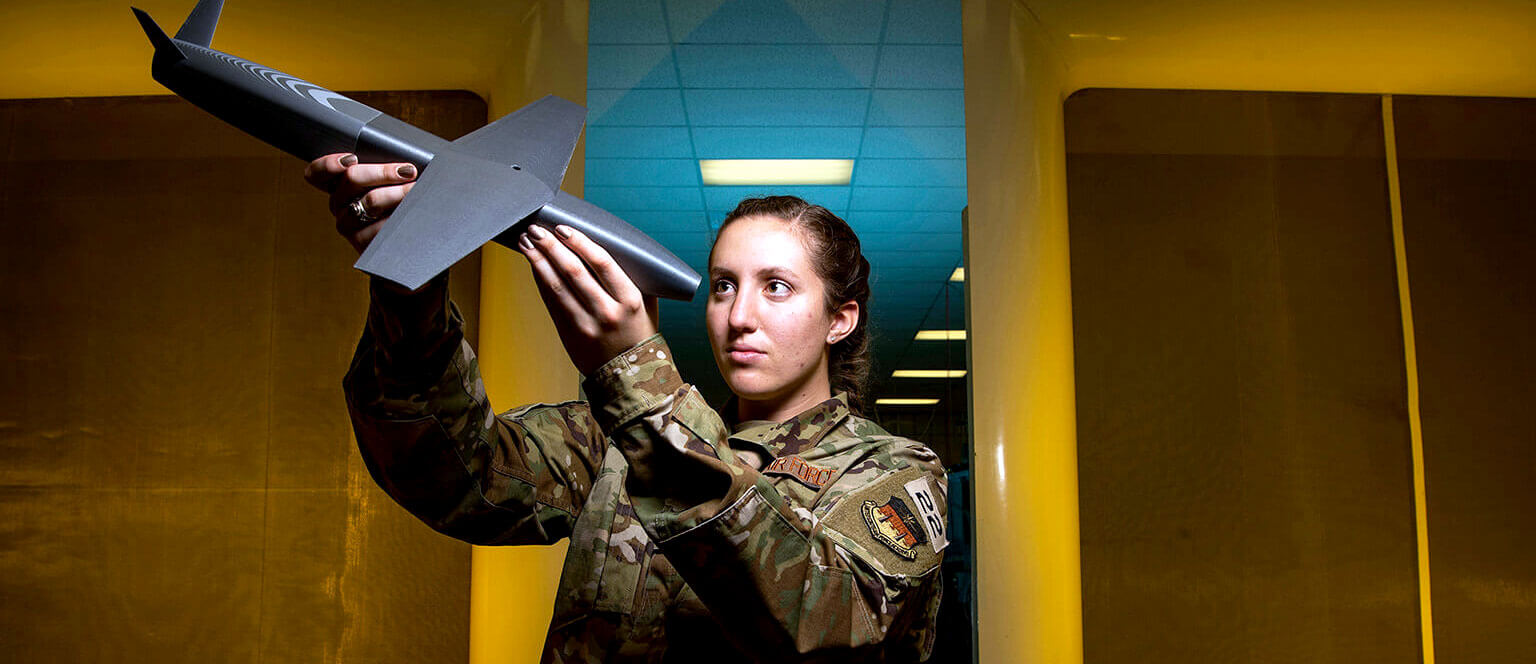AERONAUTICAL ENGINEERING

In the aeronautical engineering major, cadets study aerodynamics, propulsion, flight mechanics, stability and control, aircraft structures, materials and experimental methods. As part of their senior year capstone, cadets select either of the two-course design sequences, aircraft design or aircraft engine design.
A design-build-fly approach enables cadets and professors to dive deep into the aeronautics disciplines while providing a hands on learning experience. Cadets will work on real-world design problems in our cutting-edge aeronautics laboratory, featuring several wind tunnels and jet engines. Many opportunities exist for cadets to participate in summer research at various universities and companies across the country. The rigors of the aeronautical engineering major prepare cadets to pursue successful engineering and acquisition careers in the Air Force or Space Force.
Potential Job Assignments
Within the Air Force
Perform duties at
|
Outside the Air Force
|
SAMPLE COURSES
- Aircraft Dynamic Stability and Control
- Flight Test Techniques
- Aircraft Feedback Control Systems
- Aircraft Engine Design
- Aeroelasticity
- Computational Aerodynamics
- Advanced Aerodynamics
SUGGESTED COURSE SEQUENCE
Beh Sci 110Aero Engr 210/315Aero Engr 341Aero Design Option
| 4-DEGREE (FRESHMAN) | 3-DEGREE (SOPHOMORE) | 2-DEGREE (JUNIOR) | FIRSTIE (SENIOR) |
|---|---|---|---|
| Chem 100 | Aero Engr 241 | Aero Engr 342 | Aero Elective |
| Com Sci 110 | Chem 200 | Aero Engr 351 | Aero Eng 436 |
| English 111 | Econ 201 | Aero Engr 352 | Aero Engr 442 |
| For Lang 1 | Engr Mech 220 | Aero Engr 361 | Aero Engr 471 |
| For Lang 2 | Engr Mech 330 | ECE 315 | Aero Engr 481 |
| History 100 | MSS 251 | English 211 | Astro Engr 310 |
| Math 141 | Math 243 | Engr Mech 350 | Philos 310 |
| Math 142 | Math 245 | Math 346 | History 300 |
| Physics 110 | Physics 215 | Math 356 | Soc Sci 311 |
| Comp Sci 206x | Pol Sci 211 | Adv. Socio-Cultural Option | |
| Law 220 |
ACCREDITATION INFORMATION
The Aeronautical Engineering degree is accredited by the Engineering Accreditation Commission of ABET.
To ensure the success of our graduates, we prepare them to achieve the following Program Educational Objectives within two to five years after graduation:
- Recognition as successful Air Force officers through demonstration of their ability to:
- Rapidly acquire required knowledge
- Lead others effectively
- Apply ethical and moral standards
- Improve unit performance by application of organizational skills
- Make sound decisions based on critical thinking
- Communicate effectively
- Selection for career training on, or ahead of, schedule, and for a progression of assignments of increasing responsibility
- Demonstrated ability to solve Air Force technical problems
- Success in continuing education
These objectives are assessed through Student Outcomes—the skills, knowledge and behaviors students should acquire before graduation. The outcomes for this program are:
- Identify, formulate, and solve complex engineering problems by applying principles of engineering, science, and mathematics
- Apply engineering design to produce solutions that meet specified needs with consideration of public health, safety, and welfare, as well as global, cultural, social, environmental, and economic factors
- Communicate effectively with a range of audiences
- Recognize ethical and professional responsibilities in engineering situations and make informed judgments, which must consider the impact of engineering solutions in global, economic, environmental, and societal contexts
- Function effectively on a team whose members together provide leadership, create a collaborative and inclusive environment, establish goals, plan tasks, and meet objectives
- Develop and conduct appropriate experimentation, analyze and interpret data, and use engineering judgment to draw conclusions
- Acquire and apply new knowledge as needed, using appropriate learning strategies
Aeronautical Engineering Program Enrollment and Degree Data
| Academic Year |
Enrollment Year* | Total Undergrad Enrollment |
Bachelors Degree Awarded |
||||
|---|---|---|---|---|---|---|---|
| 1st | 2nd | 3rd | 4th | ||||
| Current | AY 23/24 Full-Time |
97 | 89 | 91 | 126 | 403 | 126 |
| 1 year prior to current |
AY 22/23 Full-Time |
105 | 95 | 125 | 108 | 433 | 108 |
| 2 years prior to current |
AY 21/22 Full-Time |
110 | 127 | 111 | 67 | 415 | 66 |
| 3 years prior to current |
AY 20/21 Full-Time |
101 | 119 | 67 | 64 | 351 | 61 |
| 4 years prior to current |
AY 19/20 Full-Time |
0 | 58 | 60 | 49 | 161 | 49 |
CONTACT US
Captain Anna Mason
Instructor, Executive Officer
DFANExecutiveOfficer@afacademy.af.edu
(719) 333-9200
Colonel James Gresham
Department Head
James.Gresham@afacademy.af.edu
(719) 333-4010